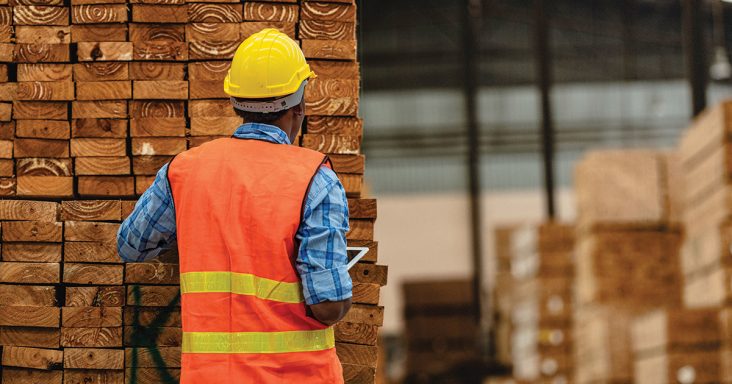Contractors see ‘some’ materials price increases amid tariffs
by June 3, 2025 11:08 am 664 views

Contractors have prepared for and continue to discuss how import tariffs – either proposed, implemented, sometimes rescinded or reduced by the Trump Administration – will impact construction material prices in Northwest Arkansas, but the timing of the impact is unclear.
Still, contractors have experienced some price increases following the tariffs. According to trade group Associated Builders and Contractors (ABC), tariffs contributed to a rise in construction materials prices in March.
“Construction input prices increased at a rapid pace for the third consecutive month in March and have now risen at a 9.7% annualized rate through the first quarter of 2025,” said ABC Chief Economist Anirban Basu. “The emerging effects of tariffs are glaring in the March data release, with iron and steel, steel mill products and copper wire and cable prices all rising more than 5% for the month. While contractors remain busy for the time being, according to ABC’s Construction Backlog Indicator, this pace of input price escalation, coupled with rising uncertainty, will cause projects to be delayed and canceled if it persists for any meaningful length of time.”
Tyson Reimer, vice president, Northwest Arkansas at Little Rock-based Kinco Constructors, said the price of structural steel has been the most volatile and “has gone up some, but it hasn’t drastically impacted us. What’s impacted us the most is that steel suppliers are only holding their price for 15 days. So, we’ve got a 15-day window to get costs locked in.”

The window used to be 30 to 45 days. Now, the decision to commit must be quicker, he said. If the owner is unwilling to decide quickly and needs 30 to 45 days, an “escalation allowance” is necessary to cover the price change.
“There’s a lot of talk about price escalation,” Reimer said. “We have not seen the price escalation impact us dramatically on the construction side from our standpoint.”
He’s also not seen any material shortages or heard rumors of shortages yet, Reimer said. “That’s the basis that we’re getting when we’re bidding jobs right now and pricing jobs here in Northwest Arkansas and also our Little Rock office.”
He said clients have faced a greater impact on their specific products than those in the construction industry. This has led one client to delay a project.
“Some of these companies we work for they were getting a lot of material from overseas, and that overseas tariff price increase affected their bottom line pretty drastically,” Reimer said. “Therefore, they put a hold on the project. It’s still in limbo right now. But then, when you’re talking about doing work in the schools or the university … the state and local stuff, we haven’t seen anything affected by those yet.”
NO IMPACT
Jason Miller, NWA division manager at Columbus, Kan.-based Crossland Construction, said the company has yet to see an impact on material prices due to tariffs.

“As far as hard pricing, I’m just not seeing it,” Miller said. “I think there’s a lot of anxiety in the market. I think budgeting is really tough right now … because nobody knows what could happen. But if it’s a job that’s pricing something today, I’m not seeing it yet.”
If tariffs affect prices, Miller said this might result in adding “clauses in our contracts … or how do we protect ourselves with the owners that we don’t have a similar situation to the first time these all were enacted or … during COVID where it’s … a crisis to our industry that we hadn’t dealt with before in a long time.”
He said the potential impact is being discussed “because nobody wants to be left paying a huge tariff and not being able to get it reimbursed.”
He’s yet to see clients delay or cancel any projects due to the tariffs.
“Prices are just high right now in … Northwest Arkansas in general,” he said. “But I can’t say that it’s because of the tariffs. They’ve been trending that way for a number of years … If we start overinflating to try to correct for a potential tariff, it’d just definitely make those jobs go off the table.”
He added that subcontractors have yet to withdraw a bid due to the tariffs, “which is all good.”
“I think we’re all doing the best we can to prepare, educate and communicate, with either how our subs communicate to us and how we communicate to the owners of what is included in their price,” he said. “And how would we protect ourselves if tomorrow there is a 25% increase on that one material that I just locked in.”
‘WAIT-AND-SEE’
Brent Farmer, vice president, area manager at Tulsa, Okla.-based Flintco, said he’s seen a “minor” impact on construction materials prices so far, including fire protection components such as sprinkler heads, steel pipe and cast iron. “We’ve had a few very small increases in just random materials — some granite materials shipping from China. We’ve had some elevator pricing increases, different components manufactured overseas.”

This fall, HVAC equipment and electrical components might be affected, as they’re largely manufactured in China or Mexico. Sourcing such technical materials domestically is challenging, but he said the company has had some success in finding other materials that are locally manufactured.
“The biggest thing right now is just the wait-and-see, the anticipation,” he said. “I feel like to some degree we’ve been able to use the material we still have on the shelves to facilitate construction, but I feel like we’re going to see impacts later this year. I just don’t think we’ve really felt the impacts, certainly not in a significant way yet.”
He’s unsure of the potential impact, but the company is projecting an annual increase of 3% to 5%. However, the impact might be between 5% and 7% this year. He said 5% is a “safe bet” for projects that are one year away.
“As tariff negotiations continue, maybe we don’t see that impact in the 5-7% range,” Farmer said. “The other thing I think is a little bit concerning is the shipping and procurement of materials might create some — not necessarily an escalation problem — but perhaps a delivery challenge for us later in the year. We’re able to stay ahead of it.”
The company has secured prices on materials, “and I haven’t had anything recently go out for bidding,” he said. “We continue to work with our clients to budget in today’s dollars … include allowances or contingency for shared risk to make sure, as we budget projects that are still six months out, that we identify an allowance for contingency that might be used for escalations down the road. But we’re still talking in that 5-7% range.”
Farmer said no projects have been delayed or canceled because of the tariffs, and “there’s still a robust pipeline of projects.”
